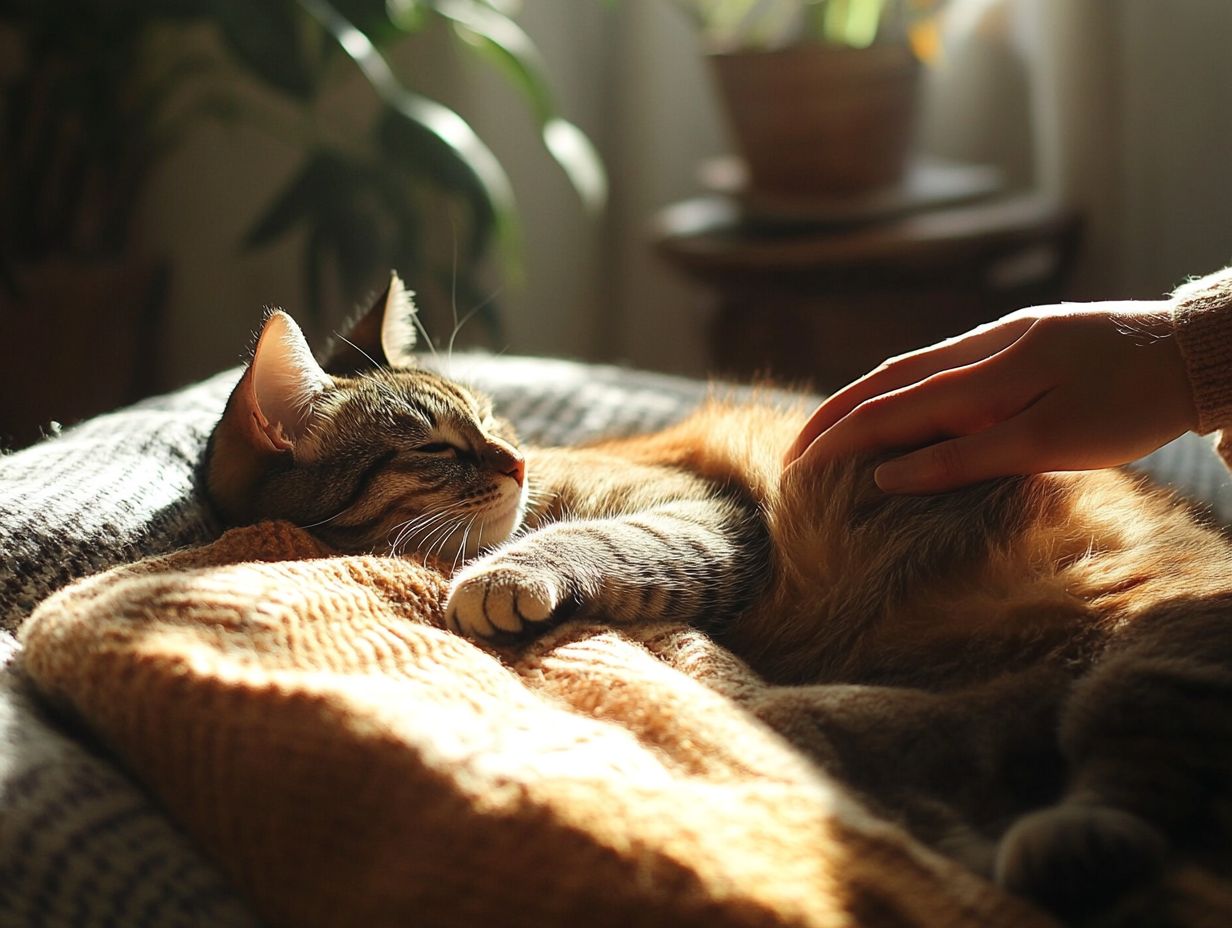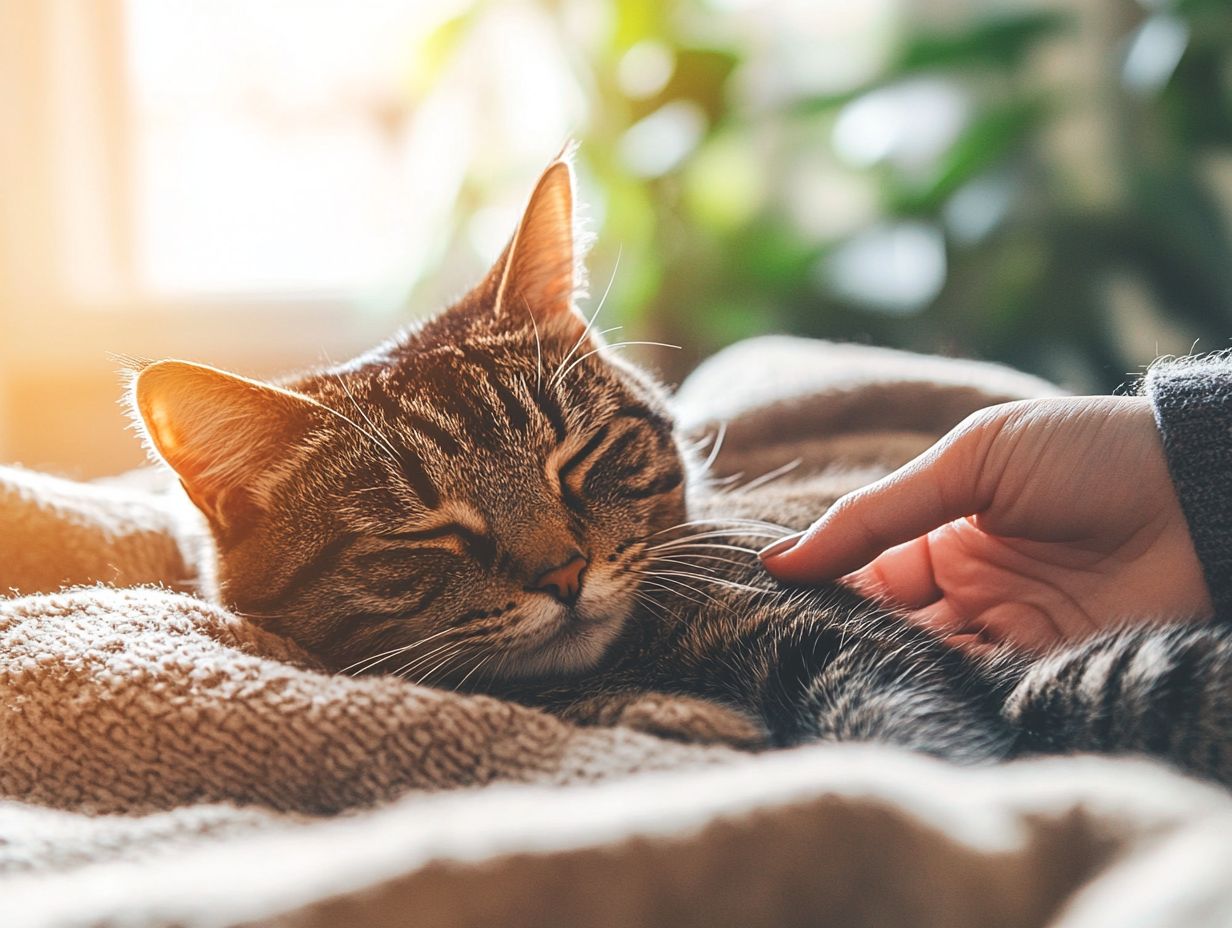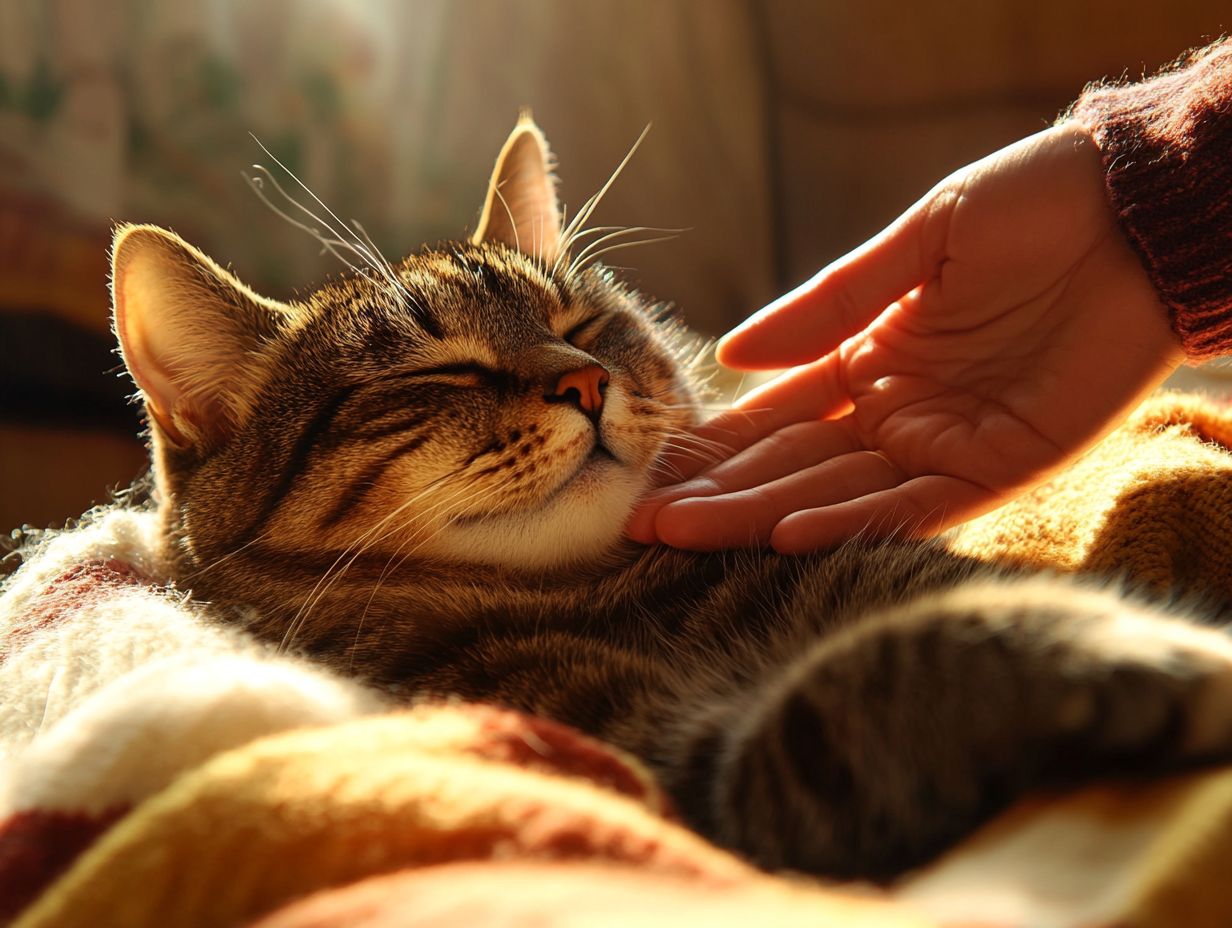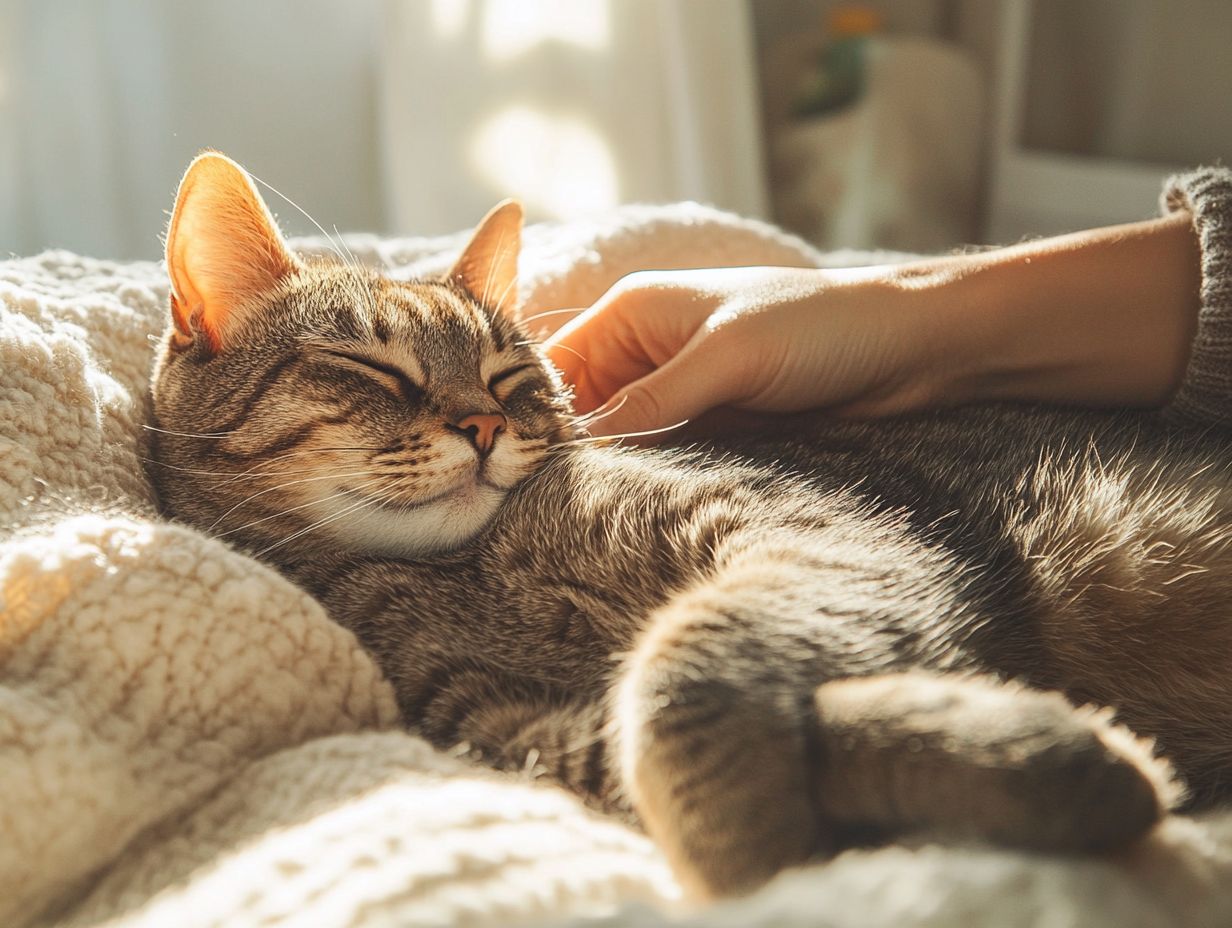Can I Train My Cat to Overcome Anxiety?
Cats, much like humans, can experience anxiety in various ways.
Understanding the root causes, including health causes and behavioral causes, along with recognizing the symptoms of feline anxiety, is the first step to help your cat.
This guide covers effective training techniques, how to create a calm home environment, alternative treatment options, and when to seek professional help.
With the right approach, you can help your cat overcome anxiety and thrive!
Contents
Key Takeaways:

- Did you know that changes in routine or environment can make your cat anxious? Look for behaviors like hiding or excessive grooming to identify the root causes.
- Training techniques such as desensitization and counter-conditioning can help anxious cats cope with triggers. Remember, positive reinforcement and consistency are key.
- Creating a calming environment for your cat is crucial. This includes providing safe spaces, using calming pheromones, and offering interactive toys to keep them mentally stimulated. Implementing stress reduction techniques will also help.
Understanding Cat Anxiety
Understanding cat anxiety is essential for any cat owner who wants to create a nurturing environment for their feline companion. Anxiety in cats can show itself through behaviors like hiding, changes in vocalization, and other shifts in behavior.
It is often triggered by various factors, including environmental stressors, past trauma, and health-related issues. By recognizing these signs, you take a vital step toward ensuring your cat’s comfort, health, and overall well-being.
This includes monitoring their litter box habits to prevent stress.
Causes and Symptoms
The causes and symptoms of cat anxiety can be complex, requiring your attention to identify them. By understanding these nuances, you can explore play therapy techniques for anxious cats to create a supportive environment that truly meets your cat’s needs.
Factors such as changes in household dynamics, loud noises, or new pets can cause unease in your cat. Look for signs like increased hiding, altered vocalization, or changes in eating habits.
Your cat might start meowing excessively or become unusually quiet both are indicators of anxiety. Recognizing these patterns allows you to implement tailored strategies that can reduce your cat’s stress and create a more comforting living space.
Training Techniques for Anxious Cats
Training techniques for anxious cats are vital to improving their behavior and overall well-being. For effective methods, consider exploring how to train your cat to manage stress, which focus on gradual changes and positive reinforcement, building comfort and confidence for your beloved companion.
By using effective behavior modification strategies, you can significantly reduce the distress of an anxious cat and explore whether pet anxiety can be cured, fostering healthy socialization and a more harmonious environment.
Behavior Modification Strategies

Behavior modification strategies are crucial for addressing an anxious cat’s unique needs. To learn more about how pet anxiety can be managed at home, these techniques involve gradual adjustments, allowing your cat to get used to new situations safely.
By using positive reinforcement, you can encourage good behavior. Reward your cat with treats or praise when they handle new experiences well. Desensitization is also important; slowly introduce your cat to new stimuli like visitors, sounds, or objects while keeping them secure in their space.
Always pay close attention to your cat’s body language for signs of stress, and go at a pace that fosters comfort and confidence. With consistent application of these strategies, you ll create a calming environment that enhances your cat’s overall well-being.
Creating a Calming Environment
Creating a calming environment for your anxious cat is crucial for reducing stress and enhancing their overall well-being. If you’re wondering can pet anxiety be treated effectively, know that by thoughtfully modifying your space, you can transform it into a sanctuary for your feline companion.
Consider incorporating scratching posts, cat trees, and interactive toys. These items encourage exploration and provide comfort. These adjustments not only enrich their environment but also minimize potential stressors, allowing your cat to thrive in a more serene atmosphere.
Home Modifications and Tools
Home modifications and tools can significantly enhance the calming environment for your cat. Incorporating elements like cat trees, scratching posts, and an array of toys ensures that your feline friend has safe spaces to retreat and feel at ease.
Create cozy nooks with soft bedding. Quiet corners away from the household hustle can reduce environmental stressors. Use calming pheromone diffusers to make the space more serene. They mimic natural scents that soothe anxious pets.
Providing interactive toys that stimulate mental engagement will keep your cat relaxed and entertained. Combine this with adjustable lighting solutions, such as soft lamps or dimmers, to cultivate a peaceful ambiance. These efforts ultimately benefit your beloved furry companion’s overall well-being.
Alternative Treatments for Cat Anxiety
Alternative treatments for cat anxiety, including anxiety medication and calming products, can provide valuable support that goes beyond traditional approaches. Additionally, creating a training plan for anxious cats can foster a sense of calm and comfort for your feline companion.
Consider options such as pheromone therapy, calming products like Feliway, and natural supplements such as Rescue Remedy. For more comprehensive strategies, explore best practices for pet anxiety training. These options help you manage your cat’s anxiety effectively, creating a more serene environment for both you and your pet.
Natural Remedies and Supplements

Natural remedies and supplements can be highly effective in managing your cat’s anxiety. Products like Feliway and Rescue Remedy are popular among pet owners who want to cultivate a more relaxed atmosphere for their feline companions. However, many also wonder if professional training can help with pet anxiety.
Beyond these well-known options, explore various calming treats infused with ingredients such as L-theanine, valerian root, and chamomile to help soothe your cat s nervous disposition. L-theanine is an amino acid known to help cats relax. It promotes relaxation without causing sedation, making it particularly advantageous during stressful moments like vet visits or changes in the home environment.
Valerian root is renowned for its calming effects and is often favored by cats for its distinctive scent and taste. Additionally, supplements containing omega-3 fatty acids are emerging as a popular choice, as they support brain health and help reduce anxiety-related behaviors.
Combine these remedies with a routine that includes playtime. Using a scratching post and creating safe spaces will greatly enhance your cat’s well-being.
Seeking Professional Help
Getting professional help for your cat’s anxiety is important. It s especially vital if symptoms keep coming back or get worse.
Consulting with a veterinarian or a behaviorist can offer invaluable insights into anxiety medications and customized strategies for addressing concerns such as separation anxiety and supporting trauma recovery. This may also involve treating any underlying illness or depression.
Don t wait if you notice your cat struggling. Quick action can make a significant difference in their well-being.
When to Consult a Veterinarian or Animal Behavior Expert
Knowing when to seek help can transform your cat’s mental health. If you notice signs of anxiety or behavior changes, professional guidance is crucial.
Watch for signs like excessive hiding, constant vocalizations, or sudden aggression. Changes in appetite, destructive habits, or inappropriate elimination may indicate anxiety that needs addressing.
Difficulty in social interactions with humans or other pets is also a significant red flag. Ignoring these behaviors can lead to escalation, making timely consultation essential.
Effective treatment often involves a blend of behavioral strategies and, when necessary, medications. This holistic approach can restore your pet’s emotional well-being.
Frequently Asked Questions
Can I Train My Cat to Overcome Anxiety?

Yes! Like humans, cats can learn to overcome anxiety through tips for training cats with anxiety issues and adjusting their environment.
What Signs Indicate My Cat May Be Anxious?
Common signs include excessive grooming, hiding, aggression, and avoiding certain people or situations.
What Behavioral Training Techniques Can Help My Cat?
Techniques like positive reinforcement, desensitization, and changing negative responses can help reduce anxiety.
Are There Natural Remedies for Cat Anxiety?
Yes! Natural remedies include calming pheromone sprays, herbal remedies, and nutritional supplements like Feliway and Rescue Remedy.
Should I Consult a Veterinarian Before Training My Cat?
Yes! Always consult a veterinarian before starting training to rule out any health issues and get personalized guidance.
Can Medication Help My Cat Overcome Anxiety?
Medication should be a last resort and only with a veterinarian s guidance. It s best combined with behavioral training for effective results.






